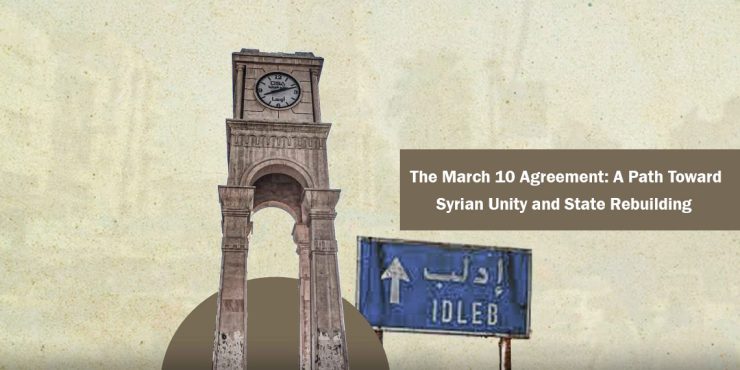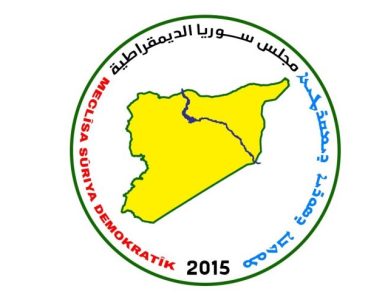By Bilal Al-Ahmad
Idlib, Syria (SDC) – The March 10 Agreement between the Syrian Democratic Forces (SDF) and the Syrian Interim Government marked a new turning point in the trajectory of intra–Syrian dialogue. It was not intended as an end to long-standing challenges, but rather as the beginning of a practical process to restore a political path that places rights and national interests at the forefront of priorities.
Both the text and the spirit of the agreement seek to bring Syrians closer together, reaffirming the need to safeguard rights, protect all social components, and overcome the divisions. If implemented successfully — both in content and mechanism — the agreement could open the door to constitutional and administrative solutions that enable the unification of national decision-making. These solutions would, in turn, help establish representative justice as a foundation for long-term stability.
A Step Toward National Reconciliation
Political activist Samer Al-Fadel, from Idlib, views the March 10 Agreement as a turning point that redefines national priorities: “The most important aspect of this agreement,” he explains, “is that it ends the myth of a purely military solution. Here in Idlib, communities have suffered from years of conflict and social tension. Any genuine effort to transform disagreements into dialogue — guided by the interests of Syrians themselves — deserves recognition and support. The success of this agreement would mean that national dialogue has regained its essential tools: national sovereignty, unified decision-making, and the capacity to manage differences within a legal and constitutional framework. This is not a victory for one side over another. It is a victory of politics over arms — a shift from the logic of regional confrontation to the logic of Syrian responsibility for Syria’s future.”
Al-Fadel adds that the success of the March 10 Agreement depends on the parties’ commitment to its implementation mechanisms. This includes ending media incitement, activating coordination channels on the ground, and creating an environment conducive to community dialogue.
Also: Homs: Civil Society and the Struggle for Syria’s Stability
He notes that people in Idlib are watching closely, hoping the agreement will lead to practical steps that build trust among Syrians. These steps include ensuring freedom of movement and trade and alleviating civilian suffering. The agreement could also open the door to locally led reconciliation initiatives under national supervision, which safeguard rights and strengthen social security.
Community Rights in Syria’s New National Framework
Academic and legal researcher Khaled Abdul Rahman stresses that any national solution that fails to prioritize the rights of social components will remain fragile: “Constitutional provisions and a renewed social contract must ensure tangible guarantees for the rights of all communities — ethnic, religious, and cultural. These rights should not be treated as privileges, but as the foundation of equal citizenship. This requires constitutional mechanisms such as an effective separation of powers, an independent constitutional court, and an electoral system ensuring fair representation. It also requires guarantees for linguistic, cultural, and civil rights across all communities. Without such mechanisms, talk of national unity remains rhetorical and masks the persistence of exclusion.”
Abdul Rahman further outlines what he calls the constitutional safety factors. These include legal provisions that prohibit discrimination and national and international oversight mechanisms to monitor compliance with fundamental rights. He also highlights the importance of fair representation in public institutions and political processes. Additionally, he points to transitional programs designed to address the legacy of historical exclusion and to ensure equal economic and social opportunities for all. He emphasizes that an advanced constitutional framework must go beyond merely declaring rights. It must build institutions capable of enforcing and monitoring those rights. Only then can equality and justice become lived realities rather than promises on paper.
Decentralization: A National Choice for Reuniting Syria
Lawyer and activist Muhammad Al-Ali addresses one of the most sensitive issues — the relationship between decentralization and the unity of the country. He explains: “Decentralization is not the same as separation. It is an administrative and political mechanism that enables local communities to manage their own affairs while preserving the sovereignty and unity of the state. The experience of absolute centralization under the previous governance model has shown that it reinforces marginalization and restricts local initiative. The decentralization we need must be based on clear principles. These include well-defined powers between the central and local authorities and fair policies for resource distribution. Central oversight of security policies is also essential, to prevent local governance from becoming a starting point for divisive agendas. In addition, an accountability and transparency system should link local performance to national standards.”
Al-Ali explains that decentralization, in the Syrian context, represents the most suitable national option for managing the country. It ensures the preservation of national sovereignty. At the same time, it grants local administrations sufficient administrative and financial powers to manage their affairs efficiently and transparently.
Also: Political and Community Initiatives Emerge in Hama
He proposes practical transitional steps for implementing this model. These include launching limited experiences in select areas and enacting legislation that guarantees the rights of local components. He also suggests initiating administrative and judicial training programs to prepare local cadres, ensuring effective justice and higher quality in service delivery.
A Replicable Model for State Rebuilding
The March 10 Agreement is not merely a bilateral document between two parties. It represents an attempt to move Syrian politics away from the logic of polarization and containment. Instead, it seeks a framework of shared national effort. The agreement creates an opportunity for administrative and constitutional solutions to be implemented as concrete policies. These policies aim to protect local communities, ensure justice and representation, and reduce the state’s long-standing reliance on absolute centralization. Such centralization has historically undermined national legitimacy.
However, genuine transformation depends on the ability of stakeholders to turn the text into actionable mechanisms. These mechanisms include constitutional guarantees and independent oversight institutions. They also require active community participation and a decentralized framework that balances local empowerment with the preservation of national unity.
If these conditions are met, the March 10 Agreement could become a replicable model for other regions of Syria. This would not be as a temporary solution. Rather, it could serve as a sustainable approach to managing diversity. It would also help rebuild a democratic, unified, and just Syrian state that would respect plurality and reject division. If, however, the parties fail to implement its provisions transparently and accountably, the document risks becoming a fragile memorandum of understanding. This would neither convince the public nor reassure concerned communities.
The path to success is challenging but achievable, and it depends on genuine commitment. It also requires the meaningful involvement of civil society in monitoring implementation. This ensures that the political economy of the agreement serves the unity of the nation. It must not create new mechanisms of power that could undermine national unity.





